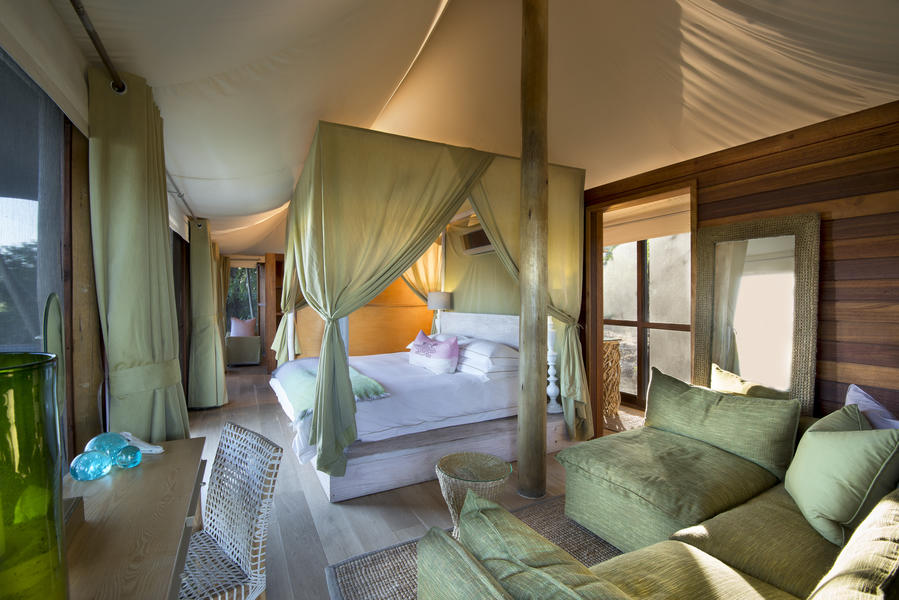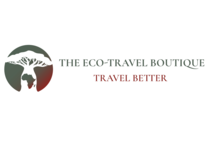Xaranna Okavango Delta Camp
Xaranna Okavango Delta Camp enjoys luxurious solitude on its own Delta island within a 272 000 hectare (672 125 acre) exclusive wildlife concession. Taking its inspiration from the water lily, Xaranna is a delightful camp with just nine ensuite safari tents that combine canvas and bleached timber. The overall atmosphere of the camp is cool, light and airy, in keeping with the gentle beauty of its environment. The safari tents are organic in design and are delicately decorated in shade of khaki and soft lily pink. Each tent boasts a romantic outdoor sala, private plunge pool, indoor bathtub and al fresco shower. The guest areas are all carefully positioned to maximise the sweeping views out across the channels, with classic Delta tree-line silhouettes. The camp celebrates Botswana’s iconography, with humorous design touches used throughout. The intimate guest sitting area boasts a spacious reading area, perfect for afternoon relaxation. The elevated dining area features shady verandas with mesmerising views leading out onto an open-air boma where exotic candlelit dinners are served beneath the stars. A fully-stocked Safari Shop offers chic outdoor gear, African art and jewellery.
Rhinos Without Borders
A COLLABORATIVE PROJECT DEDICATED TO THE SURVIVAL OF SOUTHERN AFRICA’S WILD RHINOS
Rhino horn remains one of the most sought after animal products in the illegal wildlife trade. Its value is greater than gold, making these iconic animals high-value targets for poachers.
Since 2008, more than 8,493 rhinos have been poached in South Africa, severely depleting the remaining numbers. With a rhino killed at an average rate of one every eight hours, there are more rhinos being poached than born every year.
2013: The first translocation
Years of negotiation and planning preceded the pioneering translocation of six white rhino from Phinda Private Game Reserve in KwaZulu Natal, South Africa, to Botswana’s Okavango Delta in 2013. Facilitated in partnership with Rhino Force, and with the full support of the Botswana Rhino Management Committee, this conservation coup was generously funded by lead sponsor, Motorite Administrators.
A safer future
The objective was to translocate rhino from high-risk poaching areas in South Africa and create new source populations in Botswana’s wilderness areas. Botswana was carefully selected as the recipient country due to its ecological suitability and the government’s firm commitment to the long-term success of this new rhino population. Each rhino was fitted with specially designed telemetry devices for research and active monitoring purposes.
Preparation and training
In preparation for the arrival of these first six rhino, the Botswana game scouts were provided with intensive tracking and monitoring training atPhinda Private Game Reserve. They were familiarised with the use of the satellite collars and tracking equipment designed to monitor the movement and behaviour of the rhino following their release. A portion of this equipment, as well as anti-poaching uniforms and binoculars, was supplied by the Chipembere Rhino Foundation.
2014 – 2019: Rhinos Without Borders
Following on the success of this successful translocation, Rhinos Without Borders was born in 2014 – a collaborative project between &Beyond and Great Plains Conservation. The aim of this joint initiative is to ensure the survival of Southern Africa’s rhinos by translocating a breeding population of 100 animals to a Botswana safe haven. By December 2019, 87 rhinos had been relocated.
2020: Rhinos Without Borders update
The exciting news is that the new source population of 87 translocated rhinos have grown to well over the target amount, and now include a significant number of calves born in the Okavango Delta – a great testimony to the success of this project.
In view of some recent poaching in Botswana, this initiative’s full resources and collaborative infrastructure have now been concentrated around the protection of these source populations, as they are the true legacy of Rhinos Without Borders.





